-
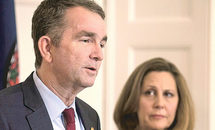
by Site Administrator
In 1729, when Jonathan Swift wrote “A Modest Proposal for Preventing the Children of Poor People from Being a Burden to Their Parents or Country,” the confounded reaction to his political and socioeconomic satire suggested he had mined a hidden truth permeating the natural law: the inherent value and dignity of every human being.
Read More
-

by Jonelle Foltz
Brian LeBlanc, Archbishop Rummel Class of 1978, was sitting with his wife in a Pensacola, Florida, neurologist’s office on Oct. 28, 2014, when the manila folder opened and a man in a white coat started reading.
Read More
-

by Jonelle Foltz
Linda and Jimmy Guillet, who were married in 1983 at Christ the King Church in Gretna, had tried for seven years to become pregnant. “That’s a very difficult, emotional roller coaster to be on when you’re not able to have a baby and everyone around you in your age group is able to,” Linda recalled.
Read More
-
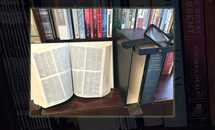
by Jonelle Foltz
Lent is coming. So is the salvation of many a harried Catholic couple with three or four mouths to feed on a seafood-only Friday night – the parish fish fry.
Read More
-
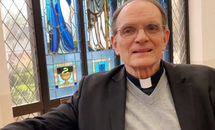
by Jonelle Foltz
I get it when people tell us to just get over it. That’s normally a therapeutic suggestion. Holding onto anger – like tightly clenching shards of glass in a balled fist – can become much more than a flesh wound to the soul.
Read More
-
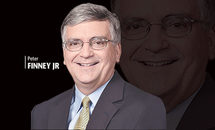
by Jonelle Foltz
Charles Dudley Warner, a friend of Mark Twain, famously remarked in 1873: “Everybody complains about the weather, but nobody does anything about it.” People often express similar feelings about the prison system. When crime and punishment are debated, usually there are competing interests at heart: justice and mercy, society’s security and personal rehabilitation. When 24th Judicial District Court Judge Scott Schlegel, a former Jefferson Parish prosecutor who had handled thousands of criminal cases, first heard about the “Re-Entry Court,” he was fascinated.
Read More
-
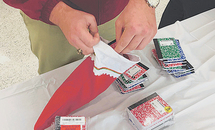
by Jonelle Foltz
As the principal of a high school run by the Brothers of the Sacred Heart, Brother Martin’s Ryan Gallagher had to take one for the team: A summer retreat in Rome. Hey, it was a tough job, but someone had to do it. The focus of the retreat, which brought together administrators from Sacred Heart schools across the world, was the charism of the order founded in 1821 by Father Andre Coindre, a priest born in Lyon, France. “One of the things that the Brothers basically reminded us in Rome was that the Brothers of the Sacred Heart essentially began in the prisons,” Gallagher said. “Father Andre started his work with the young and the imprisoned children. He started by visiting the prisons and taking boys who were orphaned and subsequently imprisoned and starting a school for them.”
Read More
-
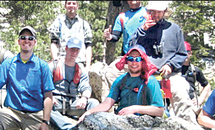
by Jonelle Foltz
When a work colleague mentioned to David Dawson Jr. about a 90-day, men’s spiritual exercise program called Exodus 90, the sales pitch he heard had the immediate appeal of a hermit wearing sackcloth and ashes, dining every night on cardboard, medium rare, and cutting the cords powering his TV, smart phone, computer and social media. “I basically told him I would pray about it and blame it on God when he told me no – because I was already working my tail off for God,” said Dawson, director of the Office of Marriage and Family Life for the Archdiocese of New Orleans and the father of seven children, the oldest of whom is 10.
Read More
-
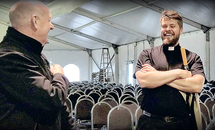
by Jonelle Foltz
We’ve been there, which makes the journey of recovery now facing St. Dominic Church in Panama City, Florida, both a history lesson and a teachable moment, filled with grace. When Hurricane Michael, a near-Category 5 storm packing winds of 155 mph, slammed into the Florida panhandle in October, it created a 40-mile wide swath of destruction for hundreds of miles in its path. “It was basically like a 40-mile-wide tornado,” said Father Michael Nixon, the 36-year-old pastor who was ordained in 2010 but never learned anything about hurricane theology in the seminary. “The devastation was just incredible. No, there was no training for this.”
Read More
-
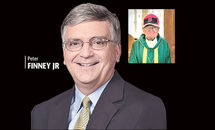
by Jonelle Foltz
My dad started his New Year’s Eve prediction column in the 1960s for the States-Item. He borrowed the idea from Pete Baird, dean of the city’s horse-racing writers, who each year would compile a complete Kentucky Derby “order-of-finish” chart before the race was even run. Baird suggested my dad make predictions for the entire year in sports.
Read More
-
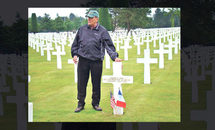
by Jonelle Foltz
Ron Drez just knew he was in big trouble. A few days after the opening of fifth grade at St. Rose de Lima School in New Orleans, Drez wrote his essay on a topic familiar to every child who ever attended Catholic school: What I Did on My Summer Vacation.
Read More
-
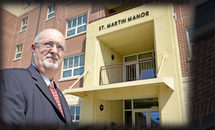
by Jonelle Foltz
Dennis Adams was attending St. Peter Church in Covington in 2004 when it looked as though his dream of becoming a permanent deacon might be going up prematurely in smoke – and it was not the kind of white smoke emanating from the Sistine Chapel.
Read More
-

by Jonelle Foltz
He had the flashy sports car and the luxury apartment in midtown Atlanta, befitting a professor of neonatology at the Emory School of Medicine. If his life were an open book, observers would say Dr. Anthony Lazzara, a graduate of Jesuit High School in Tampa, Spring Hill College in Mobile and the Tulane University School of Medicine was doing his Catholic thing very well – teaching medical students in the 1970s and early 1980s how to care for the most vulnerable patients imaginable.
Read More
-
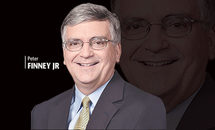
by Jonelle Foltz
Football coaches know about this because they hear it from fans all the time: What have you done for me lately? One of the reasons Nick Saban left LSU for the NFL was his personal conviction that once he had won one national championship in Baton Rouge, the Tiger fan base would accept nothing less than another … and another … and another.
Read More
-
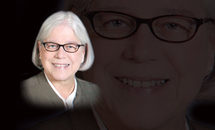
by Jonelle Foltz
It was Sept. 11, 2001, and Cheryl Orillion was less than a month into her new role as the principal of Sacred Heart of Jesus Elementary School in Norco.
Read More
-
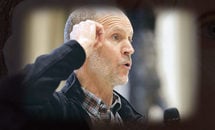
by Jonelle Foltz
Jack Jezreel of Louisville admits something up front. “I will not hide this,” he says with a smile. “I am a Pope Francis groupie.” The Catholic social justice evangelist from Louisville, Kentucky, came to New Orleans last week to offer a workshop on Catholic thought, prayer and action, and in his mind, if the three don’t burst out of the relatively safe boundaries of the parish, then, really, what’s the point? Before Vatican II, Jezreel said, people naturally “came to associate their Catholicism with how often and how committed they were to the parish block.” He said that changed after the Second Vatican Council, which suggested that ministry should happen “everywhere.” “One way that is expressed is that at the end of liturgy, there’s this theologically sublime and spiritually potent word, and that is ‘Go!’” Jezreel said. “Not ‘Go, we’ve prayed long enough,’ and not ‘Go, it’s time to vacuum,’ but it’s ‘Go’ as in the definition of what needs to happen next in terms of our faith. It’s ‘Go, and minister to the world. Take what you have received here and bring it into the world and be a healing presence.’”
Read More
-
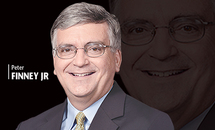
by Jonelle Foltz
God is in control. I’ll never forget the gift I was given in Katrina. Our house near the University of New Orleans had been swamped, and three weeks later, I was dragging our piano to the curb by myself. I hadn’t grown muscles where there were none. It was just that the piano was in a million pieces, and each piece had the consistency of balsa wood. I had a flashback then to when I was a kid, spending 50 cents on a balsa wood airplane kit that produced a glider lasting for at least a day or two until my younger brother inadvertently stepped on it as it came in for a crash landing through a large rectangular space in the elevated living room wall down to the runway in the den. As I stood with one of my sisters after Katrina scraping a pile of memories to the curb, she was crying. I told her, “It’s going to be OK.” One of the unearned blessings of being raised Catholic – baptized when I had absolutely no choice in the matter – is an innate sense that no matter what happens, no matter what, everything is going to be OK because God is in control.
Read More
-
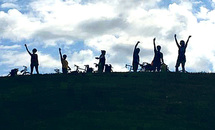
by Jonelle Foltz
From Tulane and Broad, it’s about 170 miles by bike to the Louisiana State Penitentiary at Angola, and that’s definitely not measuring by how the crow flies. For the last seven years in October, a disparate group of cyclists has ridden the back roads of south and central Louisiana, hugging the curves of the Mississippi River at times, cutting over to Airline Highway when the mighty river starts looping too crazily upon itself – making north and south anyone’s guess – then heading north into the Tunica Hills of West Feliciana Parish and finally to the razor wire of the largest maximum-security prison in America.
Read More
-
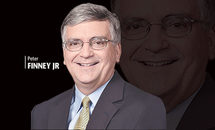
by Jonelle Foltz
Here’s the “Final Jeopardy!” answer for those who think they know everything about the local church: “As part of the Ninth General Synod of the Archdiocese of New Orleans, it is known as Priority No. 4, Goal No. 1.”
Read More
-
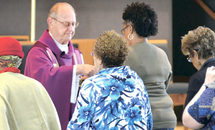
by Jonelle Foltz
There were more than 200 priests who attended the annual Archdiocese of New Orleans Priests’ Convocation last week, and Msgr. L. Earl Gauthreaux, pastor of St. Maria Goretti Parish, stood out among his casually dressed colleagues, and not just because of his peach “color rush” golf shirt.
Read More
See More



















